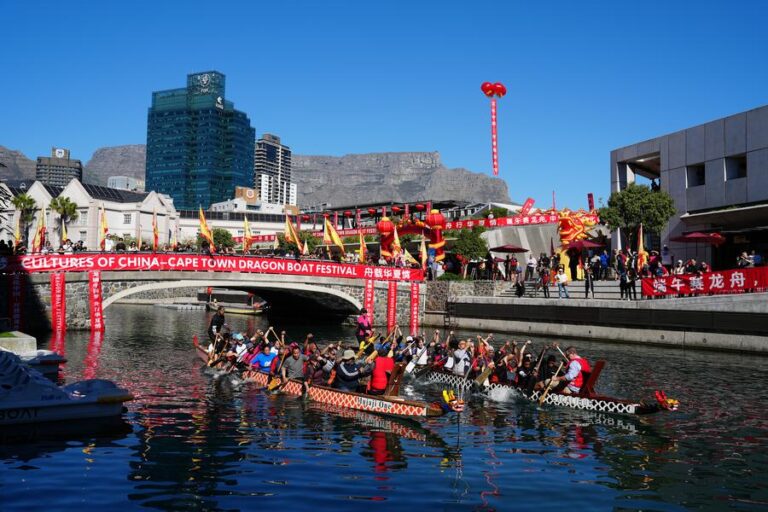Cape Town embraced traditional Chinese culture on Saturday with its annual celebration of the Dragon Boat Festival, making a splash in South Africa’s legislative capital.
CAPE TOWN, May 25 (Xinhua) — Cape Town embraced traditional Chinese culture on Saturday with its annual celebration of the Dragon Boat Festival, making a splash in South Africa’s legislative capital.
The Dragon Boat Festival, also known as the Duanwu Festival, traditionally falls on the fifth day of the fifth month in the Chinese lunar calendar. It will be celebrated on May 31 this year.
During the festival, people enjoy activities such as dragon boat races or eating Zongzi (sticky rice dumplings) to commemorate Qu Yuan, a revered Chinese poet and statesman of the Warring States period (475 B.C.-221 B.C.).
Now in its third edition, Cape Town’s two-day celebration culminated on Saturday in an exhilarating dragon boat race at Battery Park on the V&A Waterfront. Against the iconic backdrop of Table Mountain, 13 teams competed fiercely in 1,000- and 1,500-meter races, alongside crowd favorites like the water-based tug-of-war.
Dong Gang, a leader in Cape Town’s Chinese community and one of the event organizers, said this year’s festivities expanded beyond the boat races to include a series of cultural booths that offered a deeper immersion into Chinese culture. Visitors explored Chinese calligraphy, traditional medicine, tea ceremonies, cuisine, and handcrafted art.
Dong highlighted that one of the competing teams was made up entirely of local Chinese residents. “Being able to celebrate this festival together with the local people makes us truly feel that the spread of civilization is as gentle as water,” he said. “A culture, as long as it is excellent, can transcend national boundaries and be embraced by others.”
He described the festival’s growing influence as a point of pride for overseas Chinese. “The fact that the dragon boat tradition, which has been passed down in China for more than 2,000 years, can thrive at the southernmost tip of the African continent is something we overseas Chinese are proud of,” Dong said. “Hosting this traditional festival in Cape Town serves as an important platform for dialogue among civilizations.”
Among those who joined the festivities were Chinese Consul-General in Cape Town You Wenze and Cape Town Mayor Geordin Hill-Lewis, who both participated as drummers during the 1,500-meter dragon boat sprint.
“It’s absolutely wonderful. I’ve really enjoyed it. What a lovely day!” Hill-Lewis said after the race.
He praised the festival as a valuable cultural exchange. “This is a wonderful opportunity to introduce more South Africans to the wonders and beauties of Chinese culture, history, fun traditions like this, and also foods and cuisine,” said the mayor, noting that it helps civilizations connect and learn from each other, which is essential for building global unity.
Consul-General You echoed the sentiment, highlighting the significance of intercultural engagement. “Cultural exchanges are the embodiment of world diversity. Civilizations and cultures do need to communicate and learn from one another,” You said.
“The growing popularity of the Dragon Boat Festival here in Cape Town shows that there is a foundation for exchanges among civilizations and cultures,” he said. “It also highlights the distinctive charm and influence of China’s traditional culture of dragon boat racing.”
He expressed hope that the festival would allow more South Africans to experience Chinese culture firsthand and deepen mutual understanding between the two peoples.
Igsaan Salie, chairperson of the Cape Town Dragon Boat Association, noted that about 180 to 200 people attended this year’s dragon boat race. “We started with about 120 and have grown every year-on-year,” he said.
Salie described the event as “overwhelming” in the best way. “It’s possibly the most awesome thing that we’ve seen. The entire team, the overall, overarching response we’ve gotten from all of our paddlers, all of our team members, has been ‘Wow.’ It’s just been a big ‘Wow,’ like the level of decoration, the level of authenticity that came with it has been amazing. And it’s absolutely fantastic,” he said.
He emphasized the festival’s role in bridging cultures. “It’s possibly one of the greatest opportunities to just allow other people and different cultures to interact and show what we have in common, which is a lot more than what we have as a difference,” said Salie.
Reflecting on the broader significance of the event, Salie said, “I think the way we have conducted the event, which is intertwined with Chinese culture, has really facilitated a fantastic dialogue with Chinese culture in South Africa, and an understanding of how things are different and similar between the two different cultures.” ■

